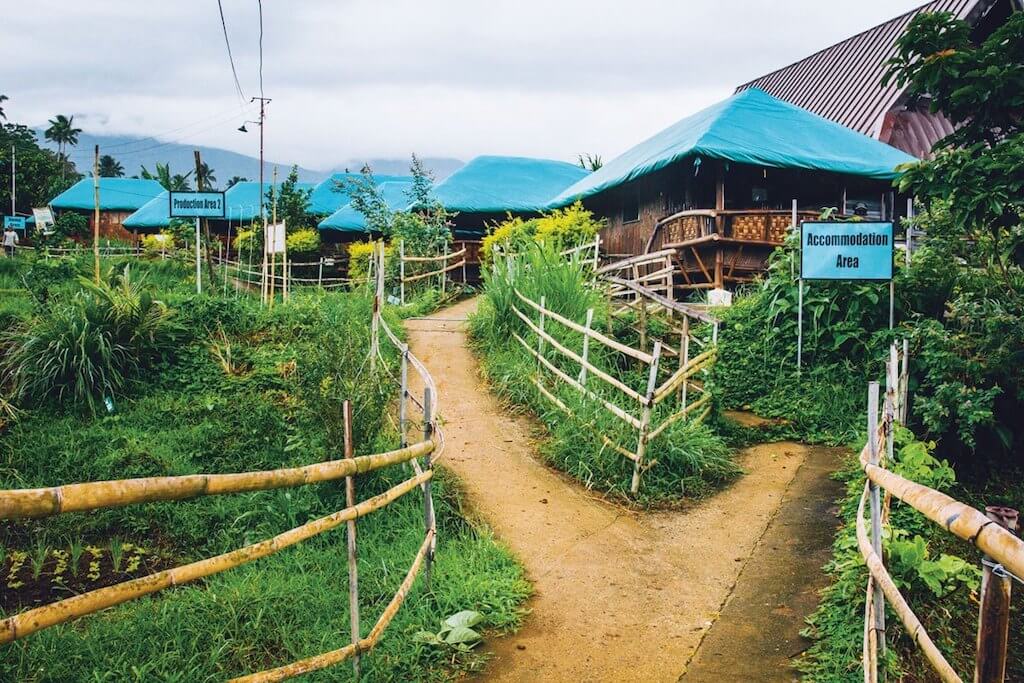Whether it’s the onslaught of seemingly endless work or the frustrating, anger-ensuing traffic situation in Metro Manila, urban life has inevitably become more complicated and challenging. And for IT professional Josie Costales, who dreams of simple living, that’s more than enough reason to leave the congested city and be that much closer to fulfilling her dream of picking dinner from her backyard. What started as a thousand square meter garden behind her Majayjay, Laguna home, Costales Nature Farm has grown to become an eight-hectare multi-crop and livestock farm, providing organic high value vegetables, poultry, and pork to major food establishments such as Cibo, the Bistro Group, Shangri-La Hotels and Resorts, and Healthy Options.
Admittedly, shifting to agriculture wasn’t easy. “The first head of lettuce didn’t grow the first time I tried planting it,” she explains. Her crops refused to grow during her first attempts, pushing her to attend local and international seminars on organic farming to learn the ropes. She eventually mastered the art and is now able to deliver tons of fresh produce for her clients. But while she was growing the company, tending and sowing their daily harvest, she didn’t know that she was actually planting seeds for another profitable project—the farm as an agritourism destination.
A paradigm shift in agriculture is slowly changing the way people perceive life outside the city. Agritourism is transforming farming by becoming an emerging alternative business model for farms. By definition, agritourism is the practice of bringing travelers to working farms for them to experience farm activities. For Costales, agritourism is as much about driving local growth as it is entertaining tourists. By breaking down barriers between the tourist and the destination, people are becoming more in touch with the countryside. Costales believes that individually, tourism and agriculture have always been enablers that spur local development. By combining both elements, agritourism generates new income sources for farmers, especially during the non-harvest seasons.


Although still in its early stages, agritourism has already received much-deserved attention locally in the last few years, evidenced by a growing body of media coverage and the declaration of the recently enacted Farm Tourism Law. Its benefits extend not just to the farm owners by way of sustainability and additional revenue, but also to the local denizens by strengthening the rural community and preserving traditions, as well as to the tour operators who are able to diversify the mix of services for both foreign and local visitors.
For Costales, one of the major benefits that isn’t usually talked about is how agritourism is influencing the local food industry. Apart from taking great pride in supplying restaurants hard-to-find produce or growing specific varieties of vegetables for them, she is also able to bring chefs closer to the source of their ingredients. By witnessing and discovering how the plants produce the items they use in their kitchen, they are able to gain a more grounded understanding and concrete appreciation of where food comes from. “Upon entering the hill up to the farm, it was obvious that its holistic and organic approach to agriculture is their mantra,” says Josh Boutwood, corporate chef of The Bistro Group. “Being able to walk around, touch, taste, and converse about the produce it grows was an awe-inspiring moment.”
By breaking down barriers between the tourist and the destination, people are becoming more in touch with the countryside. Costales believes that individually, tourism and agriculture have always been enablers that spur local development. By combining both elements, agritourism generates new income sources for farmers, especially during the non-harvest seasons.
For now, students, families, and food service professionals are Costales’ bread and butter, but she has plans of expanding her market by thinking of ways to attract millennials. With the average age of farmers at 60 and the youth refusing to go into farming, there might be an alarming shortage of farmers in the country, which inevitably would threaten food security. While agritourism probably cannot address the greater threat of food insecurity, it’s a success story that will hopefully inspire young minds to find innovative ways to farm.
This story originally appeared on F&B Report.
Get more stories like this by subscribing to our weekly newsletter here.
Read more:
How to empower the local farming industry, according to Auro Chocolate’s Mark Ocampo
Planning to try urban farming? Get help from this Facebook group
We have to support our local coffee farmers and here’s how
Writer: JACK FLAMINIANO
PHOTOGRAPHY ANGELO MENDOZA





